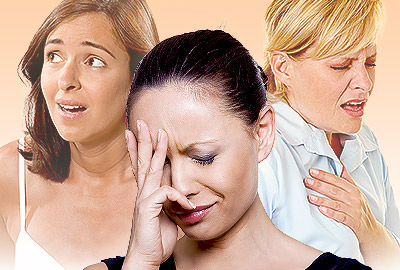Sleep disorders and anxiety episodes are both symptoms of menopause. Lack of good sleep at night can add to daytime stress, which can then lead to another night of poor sleep, creating a cycle. Because of the wide availability of sleeping pills, many people opt for convenient medications. Though sleeping pills are immediately effective at improving sleep, they are not necessarily a suitable solution for everyone. For some people, sleep medication can have side effects that prove harmful to mental wellness. Keep reading to learn more about sleep aids and anxiety.

What Is a Sleep Disorder?
Many women experience sleep disorders at some point during menopause. Reduced estrogen levels in the body affect neurotransmitters that are essential for falling asleep and staying asleep. Melatonin and gamma-aminobutyric acid (GABA), for example, have a tranquilizing effect, but they can become disrupted during menopause.
Typically, the result is insomnia, a condition that makes it difficult to fall asleep and often to stay asleep as well. Other disorders include sleep apnea, restless leg syndrome (RLS), and sleep starts. All of these can result in exhaustion and irritability, possibly leading to anxiety.
What Is an Anxiety Episode?
Anxiety episodes can come in sudden attacks, or they can linger throughout the day and eat away at your peace of mind. They are worsened by sleep disorders, since the resulting fatigue can make you less capable of focusing and completing daily tasks.
Anxiety is usually characterized by worries that build up in your mind, making it hard for you to focus on pleasures and responsibilities. This worry can build tension and pain in the muscles, as well as increase your heart rate. Restlessness and panic can lead to an anxiety episode.
Sleeping Pills
There are several types of sleeping pills available. Sedatives and hypnotics called benzodiazepines are commonly prescribed. These have a tranquilizing effect that can induce sleepiness. Other types of sleep aids that have been more recently developed are termed non-benzodiazepines. They tend to be the sleep medications with the least side effects.
Others that are prescribed are antidepressants and anxiolytic medications for the issue of emotional preoccupations disturbing sleep. Some of the most common sleeping pills, however, are over-the-counter (OTC) medications, which can be picked up from your local pharmacy without a prescription. They are recommended only for short-term use.
Side Effects
Common side effects of benzodiazepines and OTC medications are headaches, memory loss, irritability, shakiness, and restlessness. Even though you may have a restful night's sleep, the following day can be full of mental discomfort and stress. Antidepressants and anxiolytic medications can have similar side effects.
Herbal Alternatives
There are several herbal alternatives that can be used to improve your sleep. Valerian, for example, works by increasing the levels of GABA being produced by the brain, which helps balance your brain chemistry to allow for relaxation and sleep. Other herbs that have a calming and sleep-inducing effect are lemon balm and passionflower.
Sleeplessness can be difficult to deal with, but there are several options to help you manage sleep disorders during menopause. Your moods and emotions are vulnerable during menopause because of the fluctuating hormone levels in your body. If you experience anxiety episodes as a side effect of a sleep aid, your physician can help you by changing the dose or type of medication.
Continue to the following link for further information on managing anxiety during menopause.
Sources
- Food and Drug Administration. (2015). Side Effects of Sleep Drugs. Retrieved January 25, 2016, from http://www.fda.gov/forconsumers/consumerupdates/ucm107757.htm
- Pagel, J.F. and Parnes, B.L. (2001). Medications for the Treatment of Sleep Disorders: An Overview. Primary Care Companion to The Journal of Clinical Psychiatry, 3(3), 118-125. Retrieved from http://www.ncbi.nlm.nih.gov/pmc/articles/PMC181172/
- Taavoni, S. , Nazem Ekbatani, N. & Haghani, H. (2013). Valerian/lemon balm use for sleep disorders during menopause. Complementary therapies in clinical practice, 19(4), 193-196. doi: 10.1016/j.ctcp.2013.07.002
- University of Maryland Medical Center. (2013). Anxiety disorders. Retrieved January 25, 2016, from http://umm.edu/health/medical/reports/articles/anxiety-disorders
- University of Maryland Medical Center. (2013). Insomnia. Retrieved January 25, 2016, from http://umm.edu/health/medical/altmed/condition/insomnia
- University of Maryland Medical Center. (2014). Passionflower. Retrieved January 25, 2016, from https://umm.edu/health/medical/altmed/herb/passionflower



